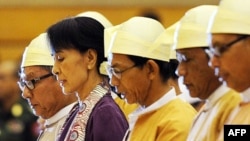Burmese opposition leader Aung San Suu Kyi and other members of the National League for Democracy have taken their seats in the Southeast Asian nation’s parliament, a month after the party’s victory in widely-watched by-elections. In a protest over the wording of the oath of office that they “safeguard” Burma’s controversial 2008 military-drafted Constitution, they had initially refused to take their seats until the wording of the oath was amended. But in a compromise, they were sworn in on May 2 and it is hoped they and the government will work together to continue to build Burma’s future.
Under the constitution, a quarter of the parliamentary seats are reserved for the military and a large majority of the others are held by the ruling party, so Ms. Suu Kyi will be very much in the minority. Nevertheless, after her swearing in she said she and her fellow party members would work to make the national assembly truly democratic.
The United States sees this as a hopeful step in the continuing process of reforms begun by the Burmese government. We are encouraging further progress on this path toward more representative governance. We and others in the international community have taken steps to support the process, including through concrete actions such as upgrading diplomatic ties, re-establishing a USAID Mission and beginning to ease our bans on the export of financial services and new investment.
But we continue to have important human rights concerns, including hundreds of remaining political prisoners and ongoing fighting in ethnic minority areas. At every opportunity we are urging the Burmese Government to address these longstanding concerns. As we see progress, we will take additional steps to recognize that progress, and we will continue to monitor developments very closely as we move forward.
Working Together To Build Burma's Future

Burmese opposition leader Aung San Suu Kyi and other members of the National League for Democracy have taken their seats in the Southeast Asian nation’s parliament.



